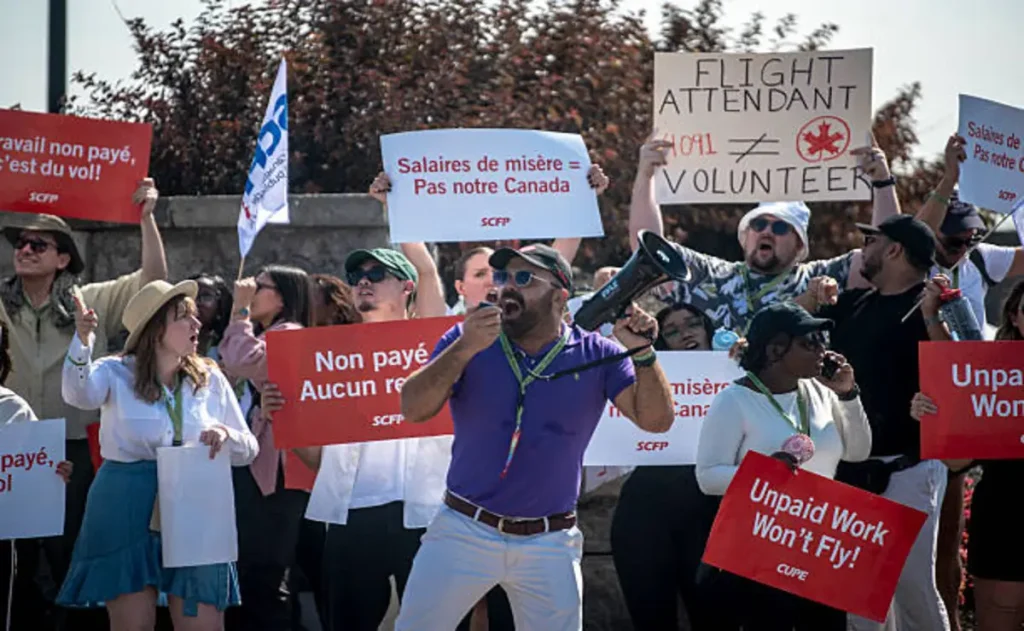
Over 10,000 Air Canada flight attendants strike, forcing nationwide flight cancellations and suspended operations. Andrej Ivanov/Getty Images
Air Canada strike disrupts national and international schedules
The walkout began around 1 a.m. ET on Saturday after flight attendants voted 99.7% in favor of a system-wide work stoppage. Within hours, Air Canada suspended operations and canceled hundreds of flights, affecting an estimated 130,000 passengers per day.
Aviation trackers reported widespread cancelations across domestic and international routes, with the majority of departures grounded as crews honored picket lines and schedules unraveled.
Operational data showed sharp spikes in scrubbed departures and arrivals, with cancellation data indicating that the airline’s mainline and regional networks were heavily constrained. The immediate consequences included stranded travelers, congested rebooking channels, and delays in time-sensitive cargo, including pharmaceuticals.
Government invokes federal powers to resume operations
Announcing the intervention in Ottawa, Hajdu said she had instructed the CIRB to require both the airline and its employees to resume and continue their operations and duties while the board manages an expedited arbitration process.
The order extends the terms of the existing collective agreement until a binding resolution is reached.
The intervention relies on Section 107 of the Canada Labour Code, a provision that authorizes the minister to direct the board to take measures necessary to protect the public interest when an industrial dispute poses serious harm to the economy or public welfare.
Officials framed the move as a targeted, time-limited step to restore stability to a critical national service.
Union condemns order, maintains push for fair compensation
CUPE’s Air Canada component criticized the directive as a restriction on the right to strike, arguing that attendants have faced years of workload pressure without adequate compensation for safety-critical duties performed on the ground.
The union reiterated demands for wage increases aligned with cost pressures and paid recognition for ground-time responsibilities, stating that cabin crew remain committed to passenger safety while seeking a fair contract.
Carrier outlines compensation offer and recovery window
Air Canada said its latest proposal includes a four-year package with a 38% increase in total compensation and a first-year hourly raise between 12% and 16%, asserting the offer would place its flight attendants among the best compensated in the country.
The airline advised customers to travel only with confirmed itineraries displayed as operating and said it is too early to commit to a firm restart schedule while the CIRB process is underway.
Also Read: Canada Backs Palestinian Statehood While Supporting Israel’s Security
Officials indicated the board could complete its initial review within 24 to 48 hours. The carrier cautioned that a full operational reset may require five to ten days, depending on crew positioning, aircraft rotations, and airport slot availability.
Canada’s second-largest airline, WestJet, said it was monitoring demand and deploying larger aircraft on select routes to absorb displaced passengers where possible.
Impact extends across passengers, cargo, and airport operations
The work stoppage rippled through major hubs, including Toronto Pearson, Montreal, and Vancouver, where gate utilization, de-icing resource planning, and security staffing are calibrated to tightly timed schedules.
With aircraft and crews out of position, planners must rebuild rotations while balancing duty-time limits and maintenance requirements. Airport authorities reported elevated volumes at service desks as rebooking windows narrowed and hotels filled near terminals.
Also Read: Canada Backs Palestinian Statehood While Supporting Israel’s Security
Freight customers faced delays as belly-hold cargo was deferred or rerouted, complicating supply chains for temperature-controlled shipments.
Logistics providers reported shifting loads to alternative carriers and trucking networks, though capacity remained constrained on high-demand corridors.
The CIRB’s mandate now includes directing the resumption of duties and overseeing arbitration on outstanding issues. Both parties are expected to submit positions on wages, paid ground-time, scheduling, and quality-of-worklife provisions.
Any settlement will need to address staffing resilience during peak seasons and predictability for crews working irregular hours across long-haul and transborder operations.




